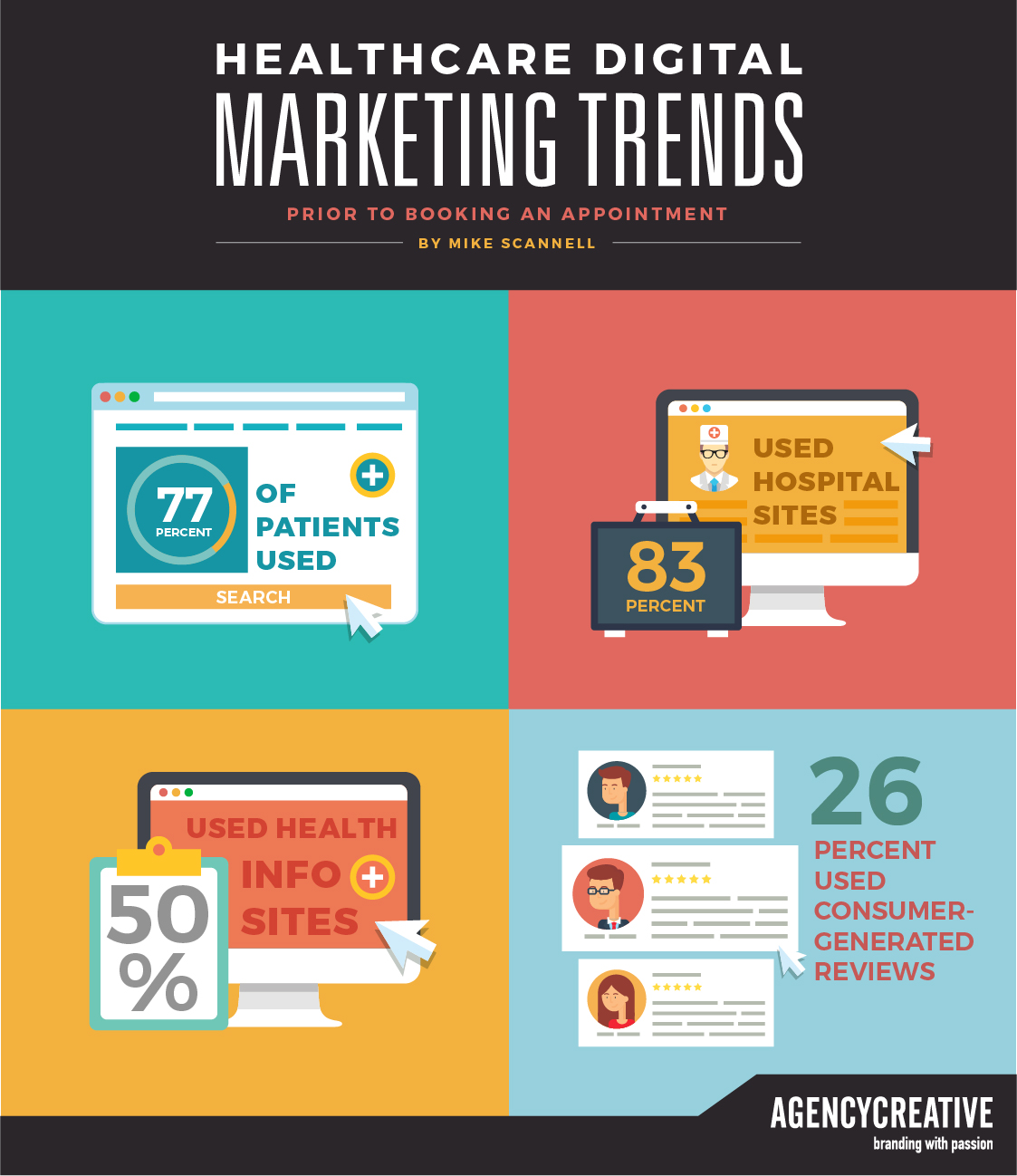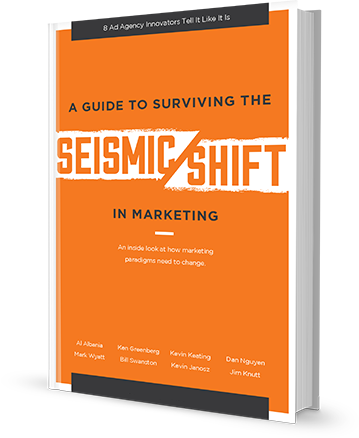A wise man once observed, “If nothing ever changed, there would be no butterflies.” Change is good. And digital marketing strategies for healthcare have seen a lot of change and transformation.
In the last decade, healthcare professionals have seen major changes in the healthcare laws, healthcare costs and how a patient selects their physicians. There have been oceans of ink spilled over debating and berating the first two of these topics. I would like to focus on the third area: How patients become our patients. Or don’t.
According to a recent Pew Research study, 77 percent of patients say they use search engines to research their medical symptoms, understand procedures, etc. before selecting a physician. Eighty-three percent report having spent a good amount of time on their hospital’s website. Fifty percent say they use health information sites to self-diagnose symptoms, research medical conditions, analyze treatment options, etc. before they book an appointment. Twenty-six percent say they used patient-generated reviews to aid in their final selection of a physician. Put this all together and what do you get? A blinding sense of the obvious: Good digital marketing content is as essential to healthcare as it is to any other business today. Maybe more so.
So here are seven healthcare digital marketing strategies and tactics that you should consider in building up your medical practice.
1) Create a robust website for your practice.
Patients these days are spending more time on Google to research their medical maladies than they spend in the doctor’s office, the waiting room and the surgery center combined. This is why your medical practice should invest in making your website everything it can be. Among other things, make sure that you include a robust patient resource section. Patients are online hunting for medical information. If yours is the site serving this information up, all the better for your practice.
2) Center your site around the patient.
Sure, the website is for your medical practice. However, if you center your site solely upon your practice, you are missing the point. A strong digital healthcare site should be centered around the patient, not around you.
3) Invest in video.
News flash: people are far more likely to view a video than they are to read a whitepaper. What better way to leverage your skilled staff than to put them on camera. Let your doctors explain symptoms, procedures and post-op recovery prospects in a video. Fill it full of animated cut aways and help diagrams that show what is happening inside their bodies and what treatment looks like. Studies reveal that high-quality video on your landing pages increases conversion rates by 80 percent.
4) Include high-performing keywords.
For your website to rank on the major search engines you need to research the most relevant keywords to include on each page of your site. For instance, if you are a colorectal practice in Cleveland, you may want to prominently include keywords like “colonoscopy Cleveland” or “hemorrhoid Cleveland OH” on the appropriate pages. A little of this goes a long way in helping your practice to gain buoyancy in search results.
5) Leverage patient-generated reviews.
Today, more than a quarter of patients are relying on patient-generated reviews to help vet the doctors in their area. People want to know about your bedside manner, not about what diplomas hang on your wall. Add a review section to your website. Encourage patients to rate your doctors. Include testimonials on your site. These patient-generated remarks can be a boon to your practice. They can also help you uncover areas for improvement.
6) Develop fresh content.
Make sure your site has a news section and a blog area. Post fresh, relevant content at least once a week. Patients are looking for information. The search engines are, too. Google rewards fresh, relevant content.
7) Don’t underestimate social media.
If your medical practice doesn’t have a Facebook page, get one. If you have one, post more often. Social media is a great way to engage today’s patient. Use your Facebook page to post patient reviews, videos, blogs, articles and more.
These, of course, are broad-brush suggestions on how better digital content can improve your marketing’s ROI. To get a more individualized assessment, call us at 972.488.1660.
Agency Creative is a Dallas advertising agency with extensive expertise in healthcare digital marketing.
In the last decade, healthcare professionals have seen major changes in the healthcare laws, healthcare costs and how a patient selects their physicians. There have been oceans of ink spilled over debating and berating the first two of these topics. I would like to focus on the third area: How patients become our patients. Or don’t.
According to a recent Pew Research study, 77 percent of patients say they use search engines to research their medical symptoms, understand procedures, etc. before selecting a physician. Eighty-three percent report having spent a good amount of time on their hospital’s website. Fifty percent say they use health information sites to self-diagnose symptoms, research medical conditions, analyze treatment options, etc. before they book an appointment. Twenty-six percent say they used patient-generated reviews to aid in their final selection of a physician. Put this all together and what do you get? A blinding sense of the obvious: Good digital marketing content is as essential to healthcare as it is to any other business today. Maybe more so.
So here are seven healthcare digital marketing strategies and tactics that you should consider in building up your medical practice.
1) Create a robust website for your practice.
Patients these days are spending more time on Google to research their medical maladies than they spend in the doctor’s office, the waiting room and the surgery center combined. This is why your medical practice should invest in making your website everything it can be. Among other things, make sure that you include a robust patient resource section. Patients are online hunting for medical information. If yours is the site serving this information up, all the better for your practice.
2) Center your site around the patient.
Sure, the website is for your medical practice. However, if you center your site solely upon your practice, you are missing the point. A strong digital healthcare site should be centered around the patient, not around you.
3) Invest in video.
News flash: people are far more likely to view a video than they are to read a whitepaper. What better way to leverage your skilled staff than to put them on camera. Let your doctors explain symptoms, procedures and post-op recovery prospects in a video. Fill it full of animated cut aways and help diagrams that show what is happening inside their bodies and what treatment looks like. Studies reveal that high-quality video on your landing pages increases conversion rates by 80 percent.
4) Include high-performing keywords.
For your website to rank on the major search engines you need to research the most relevant keywords to include on each page of your site. For instance, if you are a colorectal practice in Cleveland, you may want to prominently include keywords like “colonoscopy Cleveland” or “hemorrhoid Cleveland OH” on the appropriate pages. A little of this goes a long way in helping your practice to gain buoyancy in search results.
5) Leverage patient-generated reviews.
Today, more than a quarter of patients are relying on patient-generated reviews to help vet the doctors in their area. People want to know about your bedside manner, not about what diplomas hang on your wall. Add a review section to your website. Encourage patients to rate your doctors. Include testimonials on your site. These patient-generated remarks can be a boon to your practice. They can also help you uncover areas for improvement.
6) Develop fresh content.
Make sure your site has a news section and a blog area. Post fresh, relevant content at least once a week. Patients are looking for information. The search engines are, too. Google rewards fresh, relevant content.
7) Don’t underestimate social media.
If your medical practice doesn’t have a Facebook page, get one. If you have one, post more often. Social media is a great way to engage today’s patient. Use your Facebook page to post patient reviews, videos, blogs, articles and more.
These, of course, are broad-brush suggestions on how better digital content can improve your marketing’s ROI. To get a more individualized assessment, call us at 972.488.1660.
Agency Creative is a Dallas advertising agency with extensive expertise in healthcare digital marketing.


